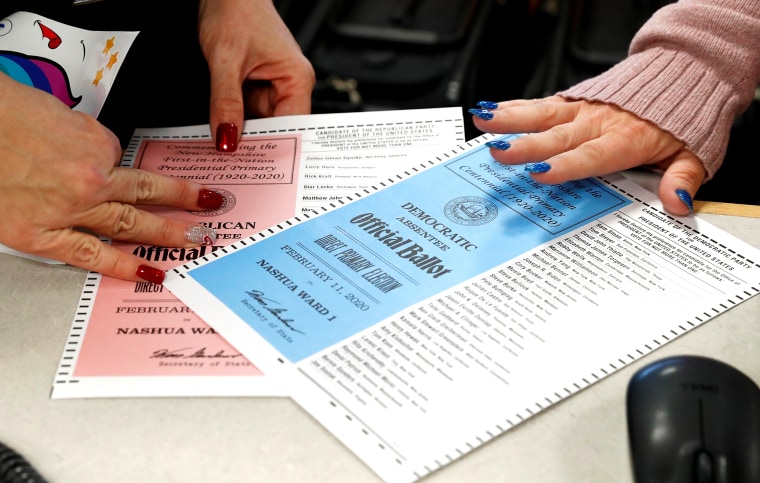New Hampshire’s election system is decidedly old school: paper ballots hand-marked by voters.
That’s mostly a good thing, election technology experts told NBC News. After Iowa’s caucuses were thrown off in part due to a faulty smartphone app, election technology is now the focus of national scrutiny.
But like any election system, New Hampshire’s isn’t bulletproof. Aging equipment and a few tweaks to its system for 2020 still present opportunities for confusion or disruption for Tuesday’s vote.
When asked about his state’s election security during a meeting of the state's Ballot Law Commission before the 2018 midterms, New Hampshire Secretary of State Bill Gardner held up a pencil.
"Want me to give it to you and see if you can hack this pencil?” Gardner said. “We have this pencil. This is how people vote in this state. And you can't hack this pencil."
The biggest immediate difference between the Iowa caucuses and New Hampshire primary is in the format itself. Iowa uses a caucus system in which people physically and publicly line up and go through rounds of “realignment” depending on which candidates receive enough support. New Hampshire, like most other states, uses a primary, in which voters largely cast secret paper ballots, as in the general election.
Also on paper are the poll books voters check in on when they show up at their polling location. The state is not using electronic versions, except in two locations that are using paper but also giving electronic poll books a field test. Electronic poll books can speed up polling location lines, but misconfiguration errors in some cases have caused concern among election security experts.
Machines scan the paper ballots, and the paper can later be recounted by hand if necessary, providing a backup against electronic threats and failures.
“While vulnerabilities exist in any voting system, the optical scan and hand-counted ballots used in New Hampshire are of less concern since the ballots can be counted without software in an audit or recount,” wrote Warren Stewart, head data scientist for Verified Voting, a nonpartisan election integrity organization, in an email. “While there is no mandated post-election audit in New Hampshire, the state is proud of its robust tradition of manual recounts.”
And unlike in the Iowa caucus, the New Hampshire primary is run by veteran election administrators, not party officials.
But the state’s ballot scanning equipment is on the older side, which can be a red flag for election security experts. The equipment, known as the AccuVote OS, sold by DominionVoting Systems, was designed more than 20 years ago. Some towns bought their machines as far back as 1996, according to the Secretary of State’s website.
The ballot-scanning machines run outdated versions of Windows that no longer get updates from Microsoft.
The contractor that services the equipment has told the state it has a stockpile of parts to last through at least 2029.
"It is not a security issue, but resiliency," said John Sebes, chief technology officer of the Open Source Election Technology Institute (OSET), a nonprofit that conducts election technology research. "Resiliency is the result of planning for various dysfunctions, and training team members on how to execute a planned response."
NBC News has collaborated with the institute since 2016 to monitor U.S. election technology and voting issues.
Jeff Silvestro, president of LHS Associates, an election services company based in New Hampshire, said in an email that the company has six regional technicians deployed around the state and a stockpile of spare parts and refurbished AccuVote tabulators ready to go.
The AccuVote system has been hacked in a few test cases, though there’s no evidence of them being hacked in a live election. New Hampshire asked a penetration tester who pulled off the hacks to tell them where their machines had vulnerabilities and how they could be fixed. Those can be dealt with through software updates or changing administrative procedures.
The state has rejected calls to institute a mandatory post-election audit where ballots are randomly cross-checked.
“So there will be no check on the results,” said Susan Greenhalgh, vice president of the National Election Defense Coalition, a nonpartisan elections integrity group.
New Hampshire is also on the stricter side when it comes to voter access. For the first time in a primary the state’s voters will have show proof of residency, along with their photo ID, which can trip up some voters. Same-day voter registration is available.


